With chocolate egg foils, hot cross bun crumbs, a mixed bag of weather and a distinct lack of family fare showing at the multiplex, it’s time to wave a fond farewell to the Easter break and look hopefully towards the summer.
Thoughts now turn to holidays on a micro-carbon emissions budget, a fail-safe diet to ensure that 20 pounds are lost before the proposed vacation (hint, the chocolate eggs didn’t help), or enduring another week hiding from 40 degree + temperatures (hotter than the Med? What HAVE we done…? On the plus side, the living room with a fan on and feet in a bucket of ice makes for a cheap staycation…)
If you’re in education, or have young folks at home of a school age, it’s time for sports days, outings, plays, school reports, trying to focus on RE lessons last thing in the afternoon in the stifling heat and passing those all-important exams. Welcome to the Summer Term!
School of Hard Knocks…
As a shared, universal experience, school days are a popular topic to be explored on film.
Chiltern Film Society has recently screened The Fencer (2015), Another Round (2020) and Things to Come (2016), all of which examined the passions and pitfalls of teaching, to various degrees. We also had Eighth Grade (2018), where 13 year old Kayla Day (Elsie Fisher), navigates her way around her American middle school the week before graduation, and Children of the Snow Land (2017), a documentary following Nepalese children from small mountain villages, who leave home for ten years in order to receive an education from Buddhist monks in a school in Kathmandu.

Playground politics
The next offering from CFS is a more sobering look at school life. Screening on Wednesday 19th April, the latest film in the programme is Playground (Un Monde) (2021), a heart-breaking, and at times gut wrenching drama about the realities of schoolyard bullying. Told from a child’s point of view, Playground is the story of Nora (Maya Vanderbeque), who has started a new school, and tries to help her brother, Abel (Gunter Duret), after she witnesses him being targeted, although this assistance is rebuked and backfires with dreadful consequences.
Written and directed by Laura Wandel, Playground is an uneasy watch that many critics have said should be essential viewing, trying to define preadolescent life. Particular praise has been lauded onto the young leads, trying to summon resilience in confusing and conflicting situations. At 72 minutes, the French language film is short but very powerful. It received several international film nominations and prizes, and was submitted as Belgium’s entry for Best International Feature at the 94th Academy Awards.
Bullying is a difficult subject to explore on screen without appearing too worthy or providing the antagonists with too much kudos.
Revenge of the nerds
In films like Grease (1978), The Diary of a Wimpy Kid (2010) and seemingly everything John Hughes (yes, him again) ever made, kids being unpleasant to each other in a school setting is just an inconvenient way of life. Both victims and perpetrators are fairly one dimensional and you only come out of the scenarios unscathed if you have an aversion to mullets or actors playing parts that they are 20 years too old for.
The cult classics of Heathers (1988) and Mean Girls (2004) provide a wry sense of detachment, where the heroine infiltrates the group of popular tormentors and ultimately (spoiler alert) wins the day (whist coining a host of catch phrases now ingrained into popular culture and paving the way for two major musicals.)

Means to an end?
Moonlight (2016), Wonder (2017) and Welcome to the Dollhouse (1995) are more adept at portraying the subtleties of how viciously young people can treat each other, while also exploring the resulting consequences for the main protagonist in the months and years to come.
Last Summer (1969) is a particularly nasty little film that I happened upon on the BBC one evening decades ago, and have never seen it, or heard mention of it since. It stars Barbara Hershey (best known for not being Bette Midler in Beaches (1988)) as a Queen Bee of a small group of teens who meet whilst on holiday on Fire Island, New York. They enjoy nothing more than tormenting, attacking and then leaving for dead seagulls, before moving onto shy girls with weight issues and a penchant for page-boy haircuts. Catherine Burns was Oscar nominated for her role as the tragic Rhonda, but stopped making films shortly afterwards, choosing instead to become a celebrated novelist. Also starring Bruce Dern and Richard Thomas (from The Waltons), Last Summer was not the was not the teen rom-com I had mistaken it to be, and I’m probably only mentioning it here so I can gain some closure. Good night John-Boy, and good riddance.
Other films exploring the most serious consequences of this cruel behaviour include the documentary Bully (2011), Korean adult animation The King of Pigs (2011) which went on to spawn a live action series, Japanese anime A Silent Voice (2016) and drama Better Days (2019), which deals with bullying and suicide. Better Days has been hailed as the best Chinese film of recent years and received universal acclaim from both audiences and critics, however, it has had limited release overseas due to censorship issues.
Why so serious?
Not everything need seem so bleak. Disturbing events in films are usually employed to move narratives along or ignite a need for change. Daniel LaRusso (Ralph Macchio – be still my beating heart), would not have become The Karate Kid (1984) (and super car washer and fence painter) without the need to stand up for himself at school. Marty McFly (Michael J Fox – also swoon inducing, back in the day) may never have felt the urge to go Back to the Future (1985) if he hadn’t wanted to put things right for his dad’s high school experience. And Andrew Neiman (Miles Teller – actually, you’re alright on this one) would not have achieved his potential as a jazz drummer, had he not been pushed to his absolute limits by teacher Terence Fletcher (J K Simmons) in Whiplash (2014).

Winner Takes It All
Taken to extreme lengths, usually backed by a state initiative, or conglomerate interference, are the narratives of teenagers becoming feral and learning to survive in tribes. (Better whisper it though, as certain multi-billionaire entrepreneurs or world leaders might consider it a good idea for their next venture…)
The technicoloured bloodbath, Battle Royal (2000), sees teens fighting to the death on an island, in a government endorsed pledge to curb juvenile delinquency.
Katniss Everdeen (Jennifer Lawrence) embarks on a similar mission as part of the nationally televised Hunger Games (2012), which eventually leads to a revolution and storming the dystopian capital.
And further proof, if needed, that boys should not be left unsupervised, can be found in either adaptation of Lord of the Flies (1963 and 1990). (Note to self, William Golding wrote the novel about an unruly band of ruffians stranded on a remote island, William Goldman wrote The Princess Bride…)
We All Stand Together
The narratives that provide the most hope are the ones where the heroes rise up against a common enemy. Hook (1992), Matilda The Musical (2022) and the St Trinian’s franchises all see children and young people unite against the big, bad adults, hatching dastardly plans, and are foiled at the last minute, usually by being shut in a cupboard or covered in something sticky from a bucket above a door.
Of course, if you’re a child and have been inadvertently roped into fighting the ultimate bad guy, a little magic can go a long way… not everyone can be an actual wizard and escape their tormentors, but it might be worth getting a DNA test and going on myfamilytree.com, just in case.

So there you are. An exploration into the darker sides of the human condition.
Nora in Playground did the right thing. Bullies thrive and depend on a code of silence.
Help is available and websites such as: nationalbullyinghelpline.co.uk, childline.org.uk and anti-bullyingalliance.org.uk provide assistance for anyone needing support or advice about issues mentioned in this article.
In a world where you can be anything, be kind.

Look out for each other, and I hope you enjoy this film more than Everything Everywhere All At Once.
See you at the movies!
Sarah
Information about the Chiltern Film Society can be found HERE




















